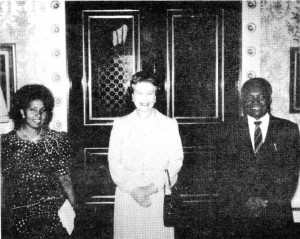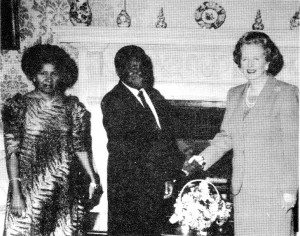It wasn’t a State Visit. No red carpets and Royal Family at Victoria Station. No carriage procession along the Mall.
But it was the very next best thing. An official visit (from June 6th to 10th, 1988) at the invitation of the British Government. And, from all accounts, President Mwinyi received a ‘right royal’ welcome. The visit was on similar lines to the farewell visit which Mwalimu Julius Nyerere made in March 1985.
PROFILE OF PRESIDENT MWINYI
Tanzania’s President Ali Hassan Mwinyi remains largely unknown outside his own country. Unlike his charismatic predecessor, Mwalimu Julius Nyerere, Mwinyi has done little travelling abroad; and even when he attended his first Commonwealth Conference last year he remained silent throughout the meeting. ‘I am a new boy and I would like to learn and listen’ he told me when I remarked on his silence.
Mwinyi has been characterised as playing two opposite roles; some say he is merely a placeman for Nyerere; others claim that he is determined to unscramble the socialist institutions created by Nyerere. Placeman or Antagonist? The answer is that Mwinyi is neither of these. He is devoted to Nyerere and an ardent believer in the kind of egalitarian socialism which his predecessor has sought to make the national ethic of Tanzania; but he is also independent-minded and, after consultation with his colleagues, he makes his own decisions.
Because he is so short, (just over five feet), modest, and rather reticent in conversation with those he doesn’t know well, it is easy to overlook the true stature of Nyerere’s successor.
Mwinyi has described himself as ‘a government official duty-bound to the public’. Although not a vanguard leader, this self-denigration as a super-civil servant does not do justice to his achievements in the first 30 months of his presidency.
He acted decisively in the way he completed the long drawn-out negotiations with the IMF in 1986 and has toughly defended his agreement against critics in the ruling party.
He has brought a new smack of authority to the running of the bureacracy and in fighting the incipient corruption that has been building up in the country. Discipline in the civil service became much tougher; obstructive senior officials were firmly dealt with; and the entire administration was made more efficient.
Like Nyerere he has been frank in admitting failures in the system and in publicly criticising the weaknesses that have become so manifest.
Mwinyi’s main political problem at present derives from the continuing troubles in Zanzibar from where he originates. Dissidents on the Isles – some of whom are determined to secure their secession from the mainland and to break up the Union – have proven hard to control despite the recent tough action in expelling seven senior government officials from the ruling party.
Colin Legum
THE VISIT
Britain’s High Commissioner in Tanzania, who accompanied the President throughout his visit, has kindly described, succinctly, for the Bulletin, all that happened during the official part of the visit.
‘Although President Mwinyi had made official visits to neighbouring countries in Africa, and to a few Asian countries, this was his first one to Europe. As such, it is being generally interpreted as a mark of a special relationship between Britain and Tanzania. The way had been prepared by Deputy Prime Minister Salim Salim, who came to London last November and by Finance Minister Cleopa Msuya who was here in March. The Daily News commented that President Mwinyi “spent five good days in Britain”, which “will go a long way in cementing relations between Tanzania and Britain.”
President Mwinyi was given lunch by the Her Majesty the Queen at Buckingham Palace and inspected a Guard of honour of the welsh Guards before calling on the Prime Minister, and dining at 10 Downing Street. He was entertained at a Government dinner at Lancaster House, at the Mansion House by the Lord Mayor and at the Royal Commonwealth Society at a joint meeting of the RCS, Britain-Tanzania Society and the Royal African Society. He also met members of the East African Association, and visited Brooke Bond, Booker Agriculture International, British Aerospace and the Overseas Natural Resources Development Institute (ONDRI). The Chairman of the Britain-Tanzania Society and senior officers called on him at his hotel. The formal part of the visit finished with a very happy reception at the Residence of the High Commissioner for Tanzania in Highgate. Mama Sitti carried out a separate programme which included the hospital for Sick Children in Great Ormond St., where a number of Tanzanian children have been treated, and where she made a donation to the wishing well appeal.
In his speeches to the East African Association, the Royal Commonwealth Society and at the Lord Mayor’s luncheon, President Mwinyj gave a frank account of the economic problems facing Tanzania, thanked donors for their help and warmly invited new investment particularly in sectors that would earn foreign exchange such as agricultural exports, natural resources and tourism. He said that there was ample room for both public and private enterprise; and particularly for joint ventures between the two. He explained that because of the present shortage of foreign exchange it was not possible at the moment to externalise some of the earnings; but the Government would honour their obligation to do so as resources allowed.
In her after dinner speech, Mrs Thatcher told President Mwinyi that Britain sympathised with the difficult economic problems which Tanzania is facing and admired the way in which he is now tackling them. She expressed the hope that Tanzania would remain in agreement with the IMF;
and pledged a further £10 million aid, to add to the £70 million Britain had already pledged over the past two years in support of the Economic Reform Programme.
The highlight of the visits outside London was a lively presentation at ONDRI on the larger grain borer (a major pest in Tanzania) and on other subjects relevant to Tanzanian agriculture. These included a practical cooking demonstration of recipes for sorghum. Booker Agriculture’s Brown Candover farm impressed the_ party; and they were Interested to see Tanzanian tea at Brooke Bond’s factory. President Mwinyi stayed on in London for two weeks after the end of his official visit for medical consultations’.
During this extended period Tanzanians from all over Britain were able to meet their President at a packed meeting organised by the Tanzania Association at the Royal Commonwealth Society (on June 12, 1988).
The language was Kiswahili and President Mwinyi was on top form. The meeting consisted of questions and answers and was scheduled to last two hours but went on much longer.
The President began by saying that he was sure that what people wanted to know was how things were back home in Tanzania. His answer was short and to the point. There had been good rains in the North and the South (not so good on the coast) “but there is enough to eat” Loud applause.
He then spoke for 25 minutes about the situation in Zanzibar. He explained the historical background to the recent tragic killings (see below) and how, for many years, Zanzibar had had a tough post- revolutionary government which had had to restrict citizen’s freedom. Now, suddenly, Zanzibar was free. It had got too much freedom too soon. And some people were abusing that freedom.
Questions ranged far and wide – tax, devaluation, commerce, tourism, housing, the idea of a freeport, cattle being allowed to wander uncontrolled in the streets, nationalisation, education…. The atmosphere was very good humoured. The President gave long and detailed replies to all questions and would not allow the Chairman of the meeting to rule out any question asked. He seemed to speak with complete assurance, only rarely calling on his colleagues on points of detail, and his answers were always totally pragmatic. Some of his oratorical gestures were almost reminiscent of Mwalimu himself.
But there was also drama. One Zanzibari said that he did not agree that the islanders were gorged with freedom. “They are free only as far as the ruling party lets them be” he insisted. For example, should the islanders wish to form a second party would the President let them? The revolution of 1964 and the bullying by the first post-revolutionary government had opened many bad wounds the President replied. More time was needed for them to heal. When the time was right, the ruling party and the government would not stand in the way of another party on the islands. But the questioner was not at all satisfied. He was eventually only prepared to resume his seat under pressure from the audience and on the understanding that he could see the President afterwards.
And Tanzania’s High Commissioner in London had a very tough time indeed on the question of delay in the issuing of passports. Africa Events summarised this final meeting well. It wrote: “The President charmed them off their legs with the dazzle of an instant smile and the homespun wit of a Kiswahili proverb” – Editor


